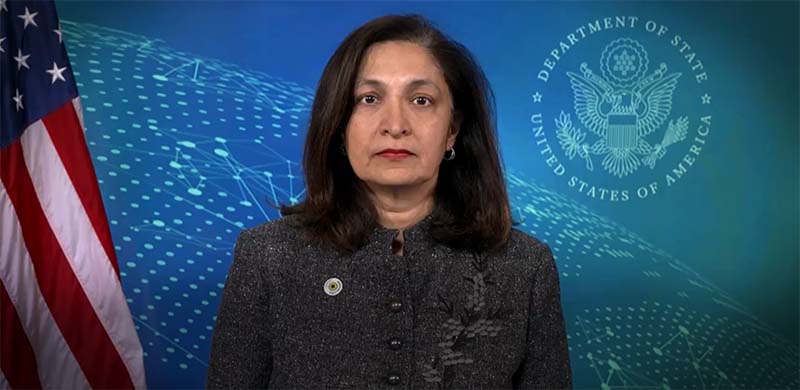Dharamshala – Uzra Zeya, US Special Coordinator for Tibetan Issues, spoke at a side event on human rights in China and Tibet on the eve of the fourth Universal Periodic Review of the People's Republic of China. She said: "Over the past four years of this review period, the People's Republic of China has consistently responded to diversity and dissent with fear, intolerance and repression. Nowhere is this more obvious than in Tibet, what is happening in Tibet is not happening in a vacuum, but concerns us all.”
China's Universal Periodic Review (UPR) will take place on January 23, 2024 in Geneva, Switzerland. It will be the fourth Universal Periodic Review of China's human rights record between 2018 and 2023. The Universal Periodic Review (UPR) is a five-yearly peer review of the human rights records of UN Member States, under the auspices of the UN Human Rights Council, which assesses the human rights records and the fulfilment of human rights obligations and commitments of other States, and makes recommendations to the State under review.
Uzra Zeya, US Special Coordinator for Tibetan Issues said, “On the eve of the People's Republic of China's fourth Universal periodic review, this is an opportunity to take stock of our shared efforts to promote and protect human rights in the PRC. From genocide and crimes against humanity in Xijinag (East Turkistan), to the rapid decline of Human Rights and fundamental freedoms in Hong Kong, to increasing transnational repression aimed at silencing dissent around the world, over the past four years of this review period, the PRC has consistently responded to diversity and dissent with fear, intolerance, and repression. Nowhere is this more obvious than in Tibet.”
“For decades, the PRC has developed a draconian system of repression that aims to "Sinicize" Tibetan Buddhism and strip Tibetans of their linguistic religious, and cultural in identity. The PRC seeks to co-opt Tibetan Buddhism traditions, most concerningly His Holiness the Dalai Lama's succession process-into the PRC's political framework and reshape its core tenets in accordance with the non-democratic values of the Chinese Communist Party. And they are wasting no time. Beginning as early as preschool, Tibetan children are forced to assimilate via government-run boarding schools, where they are purposefully severed from their language cultural and spiritual practices,” she explained.
US Special Coordinator for Tibetan Issues said, “But despite these challenges, Tibetans persist in preserving their faith and culture in innovative ways. The large turn-out for September’s Kalchakra sermon, shows us that hobbling beneath the PRC's repressive surface, lies a continued vibrancy and persistent hope for change in Tibet. Tibetan scientists, including those in the United States, ensure Tibetan voices are at the forefront of national and regional environmental solutions long practiced by Tibetan nomads. Tibetan entrepreneurs are ensuring the long-term preservation of the Tibetan language in the digital realm, using Al and other cutting-edge technologies. The strength Tibetans show in the face of this continued repression is remarkable.”
She urged, “Tomorrow the United States and the entire International Community have an opportunity and a responsibility to condemn the PRC's mass repression of Tibetans and its restrictions on human rights and fundamental freedoms throughout the country and beyond its borders. We know that none of these challenges posed by the PRC's repression can be solved by any country alone. This is why, in addition to raising these issues with the PRC government at the highest levels, the United States also continues to deep its engagement with partners and allies. We must collectively increased International solidarity in support of Tibetan's Human Rights and the preservation of their unique cultural, linguistic, and religious identity.”
She said, “In additional, as special coordinator, I am proud of the United States long-standing leadership in bringing awareness to and promoting accountability for the PRC's human rights abuses in Tibet. We continue to call on the PRC to resume meaningful and direct dialogue with the Dalai Lama or his representatives without preconditions. We also continue to take strong actions against officials involved in abuses within Tibet; including these are restrictions on PRC officials for their involvement in the forcible assimilation of more than one million Tibetan children in government run boarding schools and global Magnitsky sanctions.
“His Holiness the Dalai Lama reminds us that we are all interconnected - what happens in Tibet does not happen in a vacuum but concerns us all. In tomorrow’s review and in the future, let us take this interconnectedness to heart by promoting dialogue and collectively building a freer, happier and more just world for all,” US Special Coordinator for Tibetan Issues Zeya concluded.


![Tibet has a rich history as a sovereign nation until the 1950s when it was invaded by China. [Photo: File]](/images/stories/Pics-2024/March/Tibet-Nation-1940s.jpg#joomlaImage://local-images/stories/Pics-2024/March/Tibet-Nation-1940s.jpg?width=1489&height=878)


















